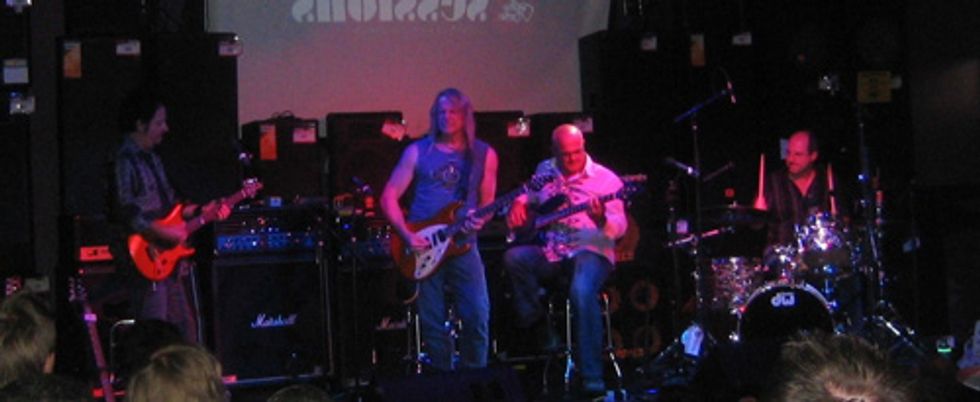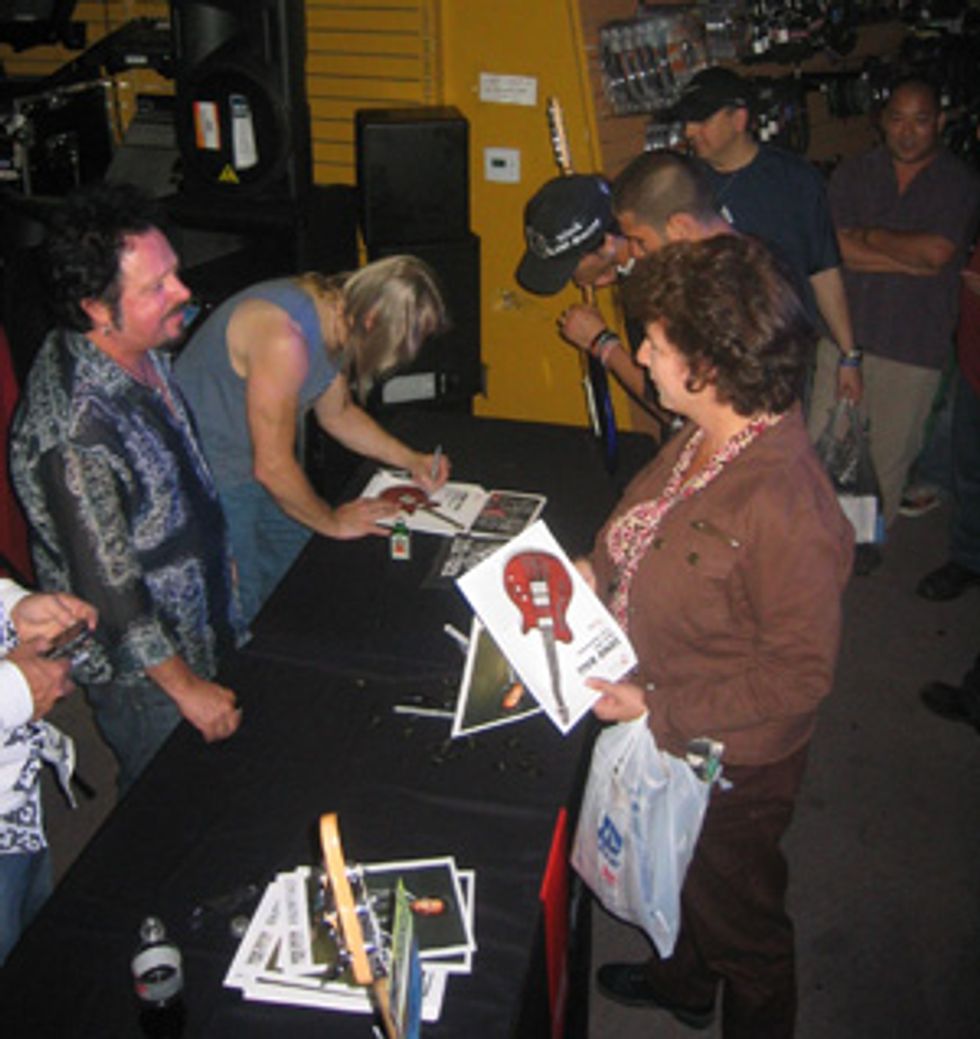Steve Lukather and Steve Morse discuss tone and rut busting at Guitar Center sessions in Hollywood.
Hollywood, CA (June 7, 2009) -- What's better than enjoying an up-close-and-personal
look at one of the world's most accomplished guitar icons? Getting a
chance to see two icons delivering deep insights, cracking jokes and
jamming together in a single memorable evening.
Steve Lukather and Steve Morse entertained and inspired an enthusiastic audience during a recent event at Guitar Center's flagship Hollywood store. The two legends were featured guests in a special gathering hosted by Sterling Ball - the head of Ernie Ball - as part of a six-city Guitar Center Sessions Series tour featuring Ernie Ball/Music Man artists.
Not surprisingly, Luke and Morse attracted a jam-packed crowd to the May 31 event, which was open to the public (as are all Sessions Series events).
For over two hours, attendees were treated to a wide-ranging event that combined freewheeling humor and jaw-dropping musicianship. Accompanying Lukather and Morse on the stage, ace drummer John Ferraro provided solid support during the various jam sessions (highlights included an extended jam on Jimi Hendrix's "Little Wing" and Motown-themed instrumental medley), while Sterling Ball rocked on bass and moderated an easygoing-yet-informative Q&A session that featured numerous questions from the audience.
Both Morse and Lukather are longtime Music Man endorsers (Morse since 1986 and Luke since 1993) and the camaraderie was evident as the icons talked about their formative years and their musical influences.
The discussion included numerous tone tips, as when Lukather described mic'ing techniques in the studio. "You have to start out with a good sound source," he admitted, "but so much of it is trial and error. Most of my favorite sounds, like on 'Voodoo Chile,' the slow version, you hear that ambient sound. They took the double stack amp, turned it around so it faced the glass, and they miked the cabinet from behind. You could also hear the guitar through a live vocal mic. When people say 'you just can't get that sound anymore,' a lot of it was ambient leakage. There is no right or wrong. If it sounds good, it sounds good."

One of the more revealing moments of the evening occurred when Sterling Ball asked Morse and Lukather "What happens when you hit the wall?" to learn their tips for refreshing their creativity.
Morse suggested that guitarists look inward to find new inspiration. "Take a different perspective. All of us were two-year-old kids at one time, with incredible imaginations where we could envision just about anything. Part of breaking out of a rut involves regressing back a bit to the point where you can imagine anything. A good way to start is to restrict yourself and force a different part of your brain to work. For instance, from a mechanical standpoint you can force yourself to play a song using only the D and G strings. You'll be forced to play up and down the neck using different shapes, and you'll force your brain to think in different ways." Morse also recommended players to "change your tuning and force yourself to envision things differently. The key thing is to avoid using the part of the brain that controls muscle memory. When you challenge yourself to play in different ways, you'll end up surprising yourself. You can be that person you were when you were two years old and you could imagine anything, but now you'll do it while using your adult skills to make it happen."
Lukather suggested an alternate approach, explaining that guitarists can look outward and seek inspiration outside their comfort zone. "I find it's really helpful to listen to music that you don't normally play yourself. After a gig I'll listen to old jazz, acoustic music, Ray Charles stuff. Go back through history and there are just some stunning, amazing players and that can inspire you. It may not be your daily diet, but you'll be surprised. You cop a couple of licks and they'll sneak into your vocabulary. The key to opening up to new ideas is like learning a foreign language."
Vamping on Lukather's point, Morse added: "Try to add one thing to your vocabulary of licks every time that you play. If you practice something perfectly ten times in a row, there's a chance that you can pull it out of your hat when you're on stage. Try some simple licks that you've never played before and play them a bunch of times. Challenge yourself to add one little thing each time."
 At the end of the evening, Luke and Morse signed autographs and met
with fans while attendees enthused about the event. 18-year-old Manuel
Badoni has been playing for five years, and he welcomed the
opportunity: "When I heard that Steve Lukather and Steve Morse would
be here, I definitely knew I could learn a few things." Steve McCloud,
a major fan of Lukather, agreed: "I play rock guitar and I try to copy
from the best," he laughed.
At the end of the evening, Luke and Morse signed autographs and met
with fans while attendees enthused about the event. 18-year-old Manuel
Badoni has been playing for five years, and he welcomed the
opportunity: "When I heard that Steve Lukather and Steve Morse would
be here, I definitely knew I could learn a few things." Steve McCloud,
a major fan of Lukather, agreed: "I play rock guitar and I try to copy
from the best," he laughed.
Dave Starks has been playing for five years and he was particularly impressed with the tone tips: "I'm a big fan of both guys, so this was a must-see. There are so many techniques that Steve Morse has that you don't hear all the time, from the volume swells to the pedal-steel effects that he gets. And his use of the tone knob effect - I never knew you could get such a strong, wah type of effect. I'm definitely going to experiment with that."
At the end of the day, that's what defines a productive clinic: guitarists left the GC event with a smiles on their faces, inspired to pick up their instruments and raise their playing a notch or two.
For more information:
Guitar Center Sessions
Steve Lukather and Steve Morse entertained and inspired an enthusiastic audience during a recent event at Guitar Center's flagship Hollywood store. The two legends were featured guests in a special gathering hosted by Sterling Ball - the head of Ernie Ball - as part of a six-city Guitar Center Sessions Series tour featuring Ernie Ball/Music Man artists.
Not surprisingly, Luke and Morse attracted a jam-packed crowd to the May 31 event, which was open to the public (as are all Sessions Series events).
For over two hours, attendees were treated to a wide-ranging event that combined freewheeling humor and jaw-dropping musicianship. Accompanying Lukather and Morse on the stage, ace drummer John Ferraro provided solid support during the various jam sessions (highlights included an extended jam on Jimi Hendrix's "Little Wing" and Motown-themed instrumental medley), while Sterling Ball rocked on bass and moderated an easygoing-yet-informative Q&A session that featured numerous questions from the audience.
Both Morse and Lukather are longtime Music Man endorsers (Morse since 1986 and Luke since 1993) and the camaraderie was evident as the icons talked about their formative years and their musical influences.
The discussion included numerous tone tips, as when Lukather described mic'ing techniques in the studio. "You have to start out with a good sound source," he admitted, "but so much of it is trial and error. Most of my favorite sounds, like on 'Voodoo Chile,' the slow version, you hear that ambient sound. They took the double stack amp, turned it around so it faced the glass, and they miked the cabinet from behind. You could also hear the guitar through a live vocal mic. When people say 'you just can't get that sound anymore,' a lot of it was ambient leakage. There is no right or wrong. If it sounds good, it sounds good."

One of the more revealing moments of the evening occurred when Sterling Ball asked Morse and Lukather "What happens when you hit the wall?" to learn their tips for refreshing their creativity.
Morse suggested that guitarists look inward to find new inspiration. "Take a different perspective. All of us were two-year-old kids at one time, with incredible imaginations where we could envision just about anything. Part of breaking out of a rut involves regressing back a bit to the point where you can imagine anything. A good way to start is to restrict yourself and force a different part of your brain to work. For instance, from a mechanical standpoint you can force yourself to play a song using only the D and G strings. You'll be forced to play up and down the neck using different shapes, and you'll force your brain to think in different ways." Morse also recommended players to "change your tuning and force yourself to envision things differently. The key thing is to avoid using the part of the brain that controls muscle memory. When you challenge yourself to play in different ways, you'll end up surprising yourself. You can be that person you were when you were two years old and you could imagine anything, but now you'll do it while using your adult skills to make it happen."
Lukather suggested an alternate approach, explaining that guitarists can look outward and seek inspiration outside their comfort zone. "I find it's really helpful to listen to music that you don't normally play yourself. After a gig I'll listen to old jazz, acoustic music, Ray Charles stuff. Go back through history and there are just some stunning, amazing players and that can inspire you. It may not be your daily diet, but you'll be surprised. You cop a couple of licks and they'll sneak into your vocabulary. The key to opening up to new ideas is like learning a foreign language."
Vamping on Lukather's point, Morse added: "Try to add one thing to your vocabulary of licks every time that you play. If you practice something perfectly ten times in a row, there's a chance that you can pull it out of your hat when you're on stage. Try some simple licks that you've never played before and play them a bunch of times. Challenge yourself to add one little thing each time."
 At the end of the evening, Luke and Morse signed autographs and met
with fans while attendees enthused about the event. 18-year-old Manuel
Badoni has been playing for five years, and he welcomed the
opportunity: "When I heard that Steve Lukather and Steve Morse would
be here, I definitely knew I could learn a few things." Steve McCloud,
a major fan of Lukather, agreed: "I play rock guitar and I try to copy
from the best," he laughed.
At the end of the evening, Luke and Morse signed autographs and met
with fans while attendees enthused about the event. 18-year-old Manuel
Badoni has been playing for five years, and he welcomed the
opportunity: "When I heard that Steve Lukather and Steve Morse would
be here, I definitely knew I could learn a few things." Steve McCloud,
a major fan of Lukather, agreed: "I play rock guitar and I try to copy
from the best," he laughed.Dave Starks has been playing for five years and he was particularly impressed with the tone tips: "I'm a big fan of both guys, so this was a must-see. There are so many techniques that Steve Morse has that you don't hear all the time, from the volume swells to the pedal-steel effects that he gets. And his use of the tone knob effect - I never knew you could get such a strong, wah type of effect. I'm definitely going to experiment with that."
At the end of the day, that's what defines a productive clinic: guitarists left the GC event with a smiles on their faces, inspired to pick up their instruments and raise their playing a notch or two.
For more information:
Guitar Center Sessions
